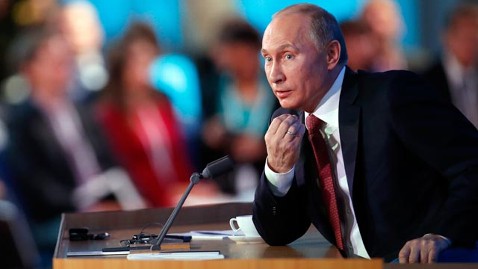Putin Avoids Questions on Ban of U.S. Adoptions of Russian Children

Russian President Vladimir Putin at news conference. (Image credit: Misha Japaridze/AP Photo)
MOSCOW - Russian President Vladimir Putin dodged numerous questions Thursday about efforts of some Russian lawmakers to cut off U.S. adoptions of Russian children.
At his first major news conference since his return to the presidency in May, Putin sidesteped the adoption issue, repeatedly telling reporters that he had yet to study the ban in depth.
"I do not know details. I have not seen the text. I need to take a look at it. I will do that today or tomorrow," he said at one point.
"I will make a decision depending on what is written there," he continued, declining to say if he would sign such a ban.
Russia is the third most-popular country for Americans looking to adopt children. About 45,000 Russian children have been adopted by U.S. parents since the fall of the Soviet Union at the end of 1991. Putin said he believed that most Americans trying to adopt children were "decent and honest people."
Putin did, however, express strong support for the broader bill that is making its way through the lower house of parliament, which, by imposing reciprocal sanctions on American human rights abusers, including those accused of abusing Russian adopted children, signals retaliation for a set of human rights sanctions passed by the U.S. Congress earlier this month.
Putin blasted U.S. courts for treating those accused of abusing Russian adopted children too leniently, and criticized U.S. officials for failing to properly set up a new adoption agreement between the two countries that would give Russian officials access to adopted children who were allegedly abused.
Members of the ruling United Russia Party added the adoption ban as an amendment before a second reading of the bill on Wednesday. It faces a third and final reading as early as Friday, but it still requires the support of the upper house of parliament, as well as Putin's signature before it becomes law.
Since its introduction, several human rights advocates have complained that the measure is playing politics with the lives of orphans. Russia's Foreign Minister Sergei Lavrov came out against the adoption ban earlier this week, calling it "wrong" and adding that foreign adoption was a legal right. The country's education minister also voiced his opposition.
Russia's children's ombudsman Pavel Astakhav, however, said he supported the ban, adding that he believes it should have happened years ago.
At today's news conference, meanwhile, Putin lashed out at the United States for imposing the human rights sanctions, known as the Magnitsky Act. Putin said the act - which would refuse visas and freeze the U.S. assets of Russians accused of human rights violations - "poisoned" U.S.-Russian relations, and was just another effort by Congress to pass anti-Russian legislation. "If they spank us, we must reply, otherwise they will keep spanking us," said Putin.
At one point Putin chastised a Russian journalist who challenged his support for the adoption sanctions, asking him why he would support sending Russian children overseas, and to the United States in particular.
"Are you a sadomasochist?" Putin asked him.
The news conference was a marathon, lasting more than four hours. It became unruly at times, with journalists hollering and waving banners, signs, scarves, even balloons, to try to get the attention of Putin's spokesman, who picked the questioners. Foreign journalists were invited, but only a few were selected to ask questions. Even so, it was the Russian journalists who asked most often about the possible adoption ban.
One female journalist fawned over the president, calling him "handsome" and "energetic," then asked where the rumors of his poor health were coming from. Putin dismissed the rumors, saying they were spread by his political opponents.
Another journalist asked about Putin's family, usually a taboo topic considered off-limits. The president answered tersely, saying that his daughters were living, working and studying in Moscow, and doing well. Putin is famously protective of his family. No photos of his adult daughters can be found, even on the Internet.
"I am proud of them," he said, ignoring the part of the question that asked if he was a grandfather yet.
A number of questions were uncharacteristically pointed, including ones about human rights in Russia and judiciary independence. Putin denied that he had ever sought to influence a court ruling, and often compared reports of abuses in Russia to similar reports in the United States.
Asked by a Russian newspaper reporter about how he built an "authoritarian regime," Putin was put on the defensive, saying he did not agree with that characterization.
Putin was also asked whether Russia was becoming diplomatically isolated because of its continued support for Syrian President Bashar al-Assad. He denied that was the case and reiterated Russia's opposition to international intervention. He pointed to the post-liberation chaos in Libya as an example of why foreign interference is not a good idea. He said he was more worried about what happens in Syria after Assad leaves than if he stays.
The press conference ended when a Russian journalist asked Putin to sign a birthday card for his daughter. The president whipped out a pen and said he was happy to oblige.